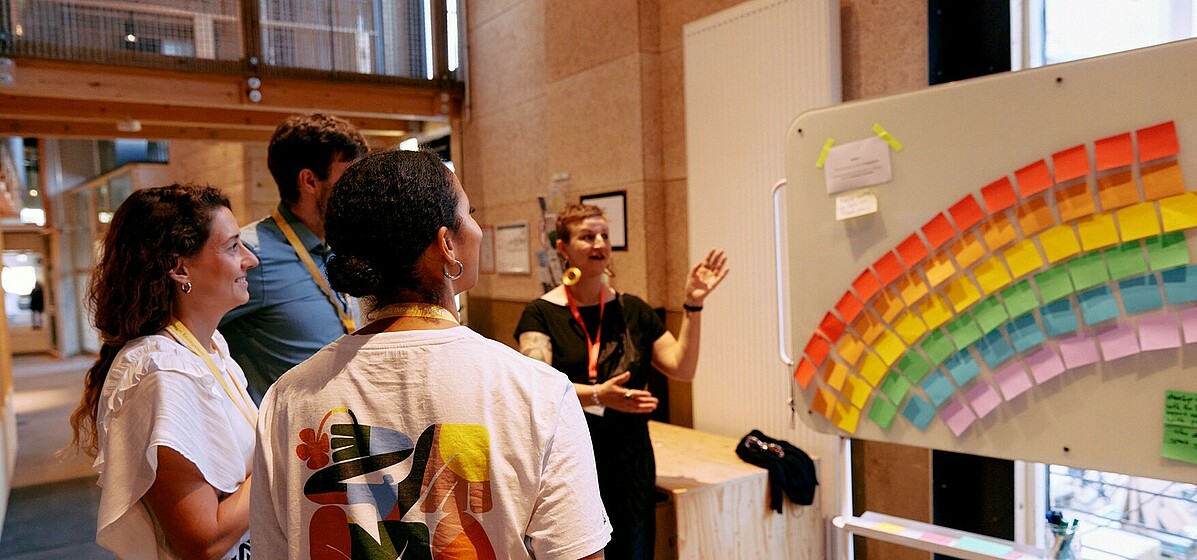Faces of Impact
Where Purpose Meets Innovation
Berlin has emerged as a vibrant hub for impact-driven entrepreneurship, where founders are harnessing the power of innovation to address some of society's most pressing challenges. From circular construction and refugee education to AI-powered food preservation and drone reforestation, the city's ecosystem nurtures startups that balance profit with purpose.
What sets Berlin apart is its unique blend of technological expertise, progressive policies, and collaborative spirit. The capital offers not just funding opportunities and accelerator programs, but a community of like-minded innovators committed to creating meaningful change. Organizations like Impact Hub Berlin stand at the center of this ecosystem, connecting entrepreneurs with the resources, networks, and spaces they need to thrive.
The following interviews spotlight five pioneering founders who represent the diversity and ambition of Berlin's impact landscape. Their stories reveal a common thread: a deep understanding of the problems they're solving, a practical approach to implementation, and an unwavering belief that business can be a powerful force for good. As these leaders demonstrate, Berlin is not just creating the next generation of successful startups—it's nurturing ventures that are reimagining our collective future.
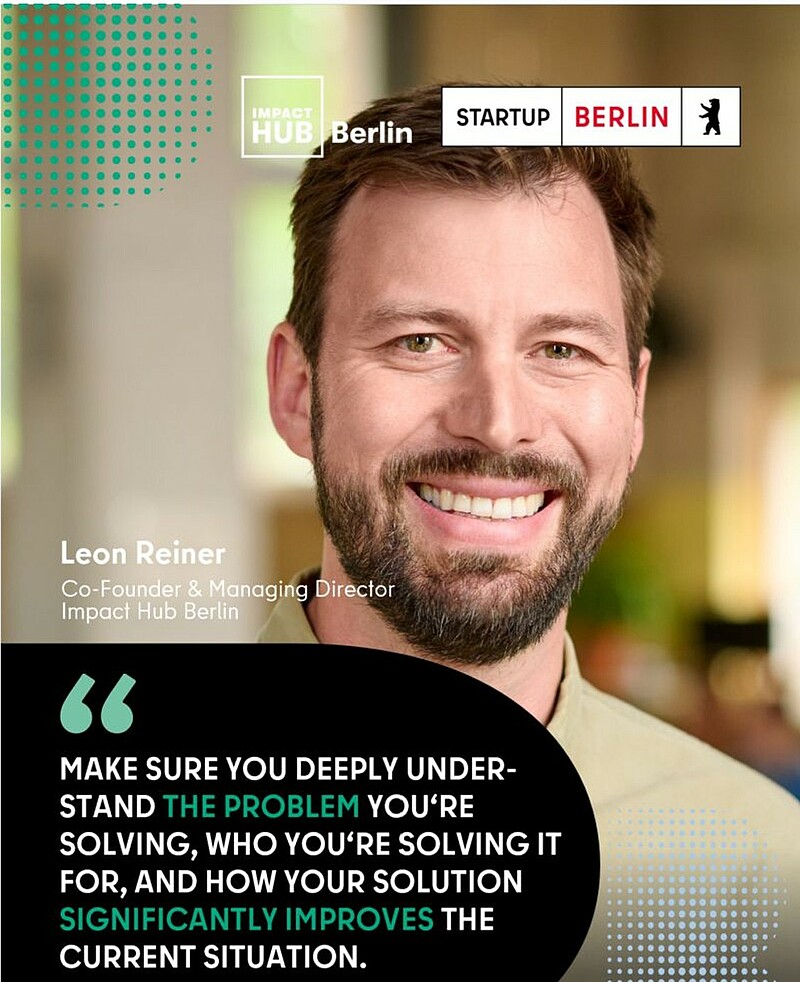
What does impact mean to you?
At Impact Hub, "impact" refers to creating positive, measurable change in society, the environment, and the economy. This concept lies at the core of Impact Hub Berlin's mission: empowering impact-driven businesses by providing them with the resources they need to succeed.
Impact is viewed through several key lenses: Social impact, environmental impact and economic impact
What are your main tasks and responsibilities at Impact Hub Berlin?
Impact Hub Berlin is an award-winning innovation hub dedicated to helping impact-driven businesses succeed. At the heart of its approach is a thriving impact ecosystem comprising accelerators, tailor-made programmes, key stakeholders, and a community of over 600 innovators and entrepreneurs. All activities are anchored in the 3,500 sqm award-winning coworking space in Berlin-Neukölln, designed using state-of-the-art circular construction and design methods.
What is your vision for the Berlin startup ecosystem?
I envision Berlin becoming the leading global startup ecosystem centered on impact by 2035.
What projects are you currently most excited about?
We are thrilled to be launching a new accelerator, Fashion Forward, which operates at the intersection of fashion, sustainability, and AI. Join us for one of the amazing events to meet the startups! Also, we currently have some offices for rent and are accepting members into the community.
What advice would you give to aspiring founders or impact startups?
Make sure you deeply understand the problem you’re solving, who you’re solving it for, and how your solution significantly improves the current situation. This clarity is essential for securing funding and achieving your desired impact.
That being said, just go for it! Being an impact entrepreneur is something you can only learn by doing. More than anything else, we need amazing people working to create positive change!
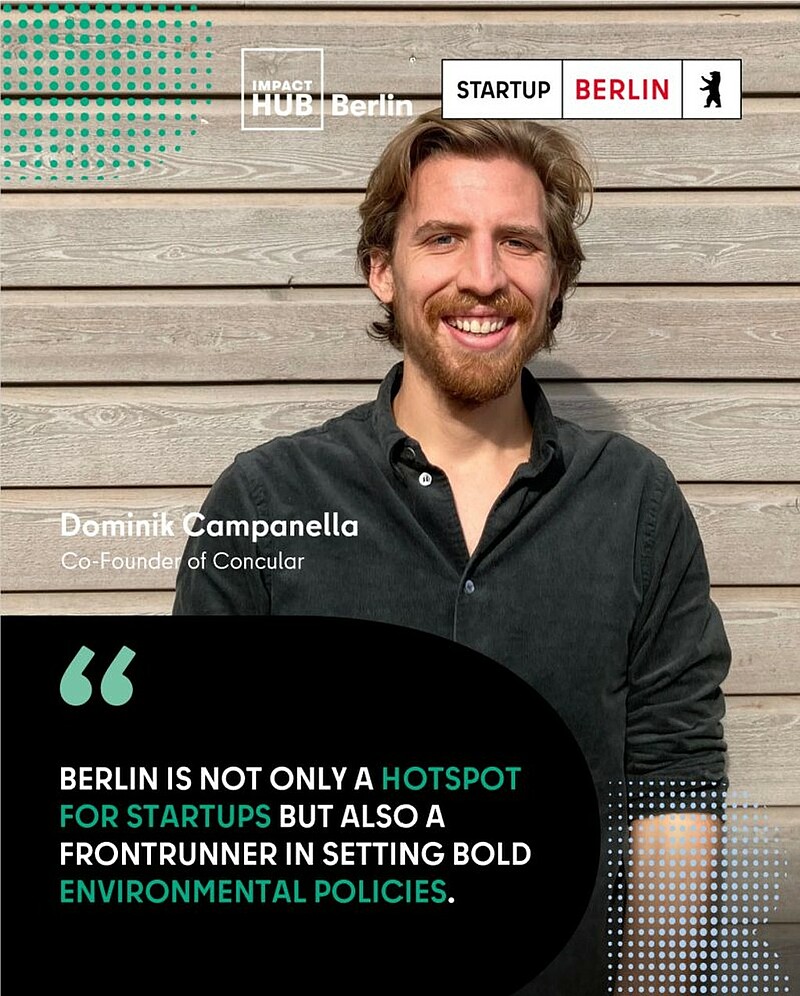
Can you tell us about your impact startup or project?
Concular, is the leading ecosystem for circular construction. We enable the reuse of building materials by providing digital tools and services that connect various stakeholders in the value chain—from demolition companies to architects and building owners. By doing so, we reduce CO₂ emissions, waste, and resource extraction significantly. To date, we’ve facilitated over 500 projects across the DACH region, including iconic developments like the FAZ Headquarters in Frankfurt and the Karstadt Hermannplatz in Berlin.
Why did you choose Berlin as the base to bring your idea to life?
Berlin has a unique blend of innovation, diversity, and a strong commitment to sustainability. The city is not only a hotspot for startups but also a frontrunner in setting bold environmental policies. This dynamic environment fosters collaboration and drives change, making Berlin the ideal place for a purpose-driven startup like ours to thrive and scale.
How do you envision the future of Berlin’s startup ecosystem?
I see Berlin continuing to solidify its position as a European leader for impact-driven innovation. The ecosystem is maturing, with more access to funding, specialized accelerator programs for sustainability, and a stronger collaboration between the public and private sectors. In the future, I hope to see even more cross-industry partnerships and regulatory frameworks that encourage long-term systemic change.
What advice would you give to aspiring founders or other impact startups?
Just go for it! Don’t wait for the perfect moment — it will never come. Start small, learn quickly, and iterate as you go. At the same time, prioritize building a strong network from day one.
Which Berlin-based resources, events, or networks have been the most helpful on your journey?
Impact Hub Berlin, Berlin Partner für Wirtschaft und Technologie GmbH, GREENTECH FESTIVAL
Networking spotlight: Are there any specific impact collaborations you’re seeking?
We are always open to collaborations with municipalities, large building owners, project developers, and investors who are passionate about scaling circular solutions in the built environment. Additionally, we’re keen to work with research institutions to further develop data-driven insights for material reuse and policy recommendations.
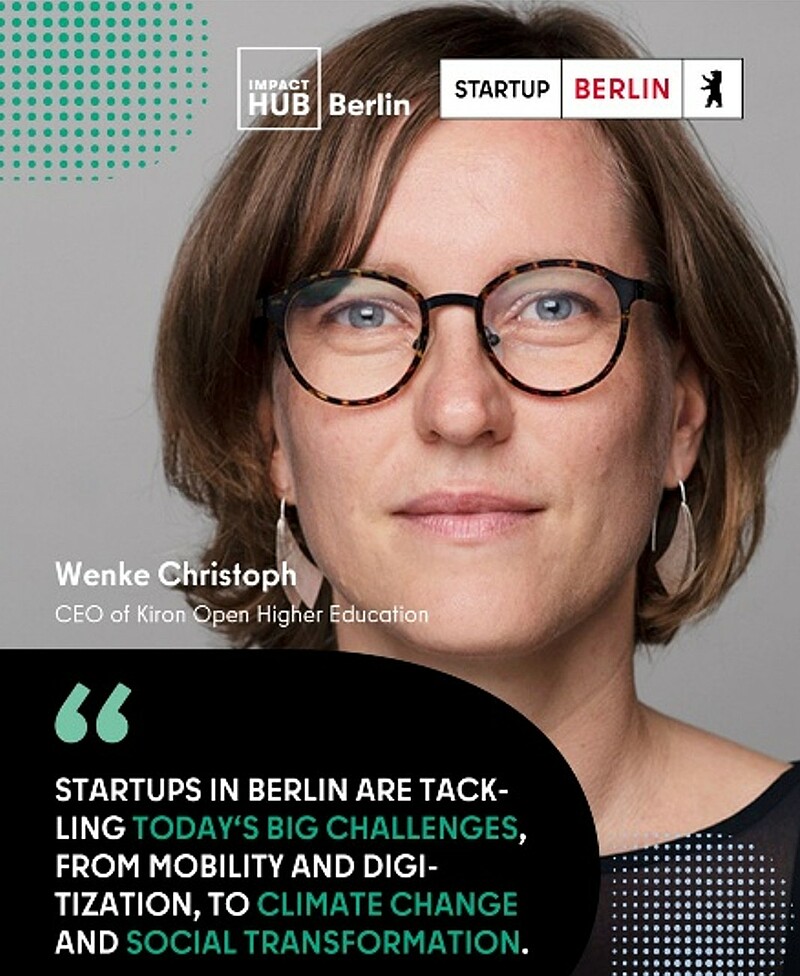
Can you tell us about your impact startup or project?
Kiron Open Higher Education offers free learning programs to refugees and migrants facing barriers to education and career opportunities. Through our digital learning platform, Kiron Campus, we have supported over 150,000 learners in acquiring essential skills for the labor market.
Why did you choose Berlin as the base to bring your idea to life?
We chose Berlin as its base because of the city’s central role in education and innovation. As Germany’s capital, Berlin is home to key ministries, numerous NGOs, and a vibrant tech and edtech startup scene—an ideal ecosystem for Kiron as an EdTech NGO.
How do you envision the future of Berlin’s startup ecosystem?
Startups in Berlin are tackling today’s big challenges, from mobility and digitization, to climate change and social transformation. With its rich talent pool, strong infrastructure, and commitment to social and ecological impact, Berlin will remain a magnet for entrepreneurs solving global problems.
What advice would you give to aspiring founders or other impact startups?
I would ask aspiring founders to prioritize collaboration, as impactful, scalable solutions often arise from networks that bridge diverse fields, including the social sector and civil society. I’ve seen how partnerships can foster innovation and develop solutions especially in times of crises.
Which Berlin-based resources, events, or networks have been the most helpful on your journey?
With our membership in SEND (Social Entrepreneurship Netzwerk Deutschland e.V.) and Impact Hub Berlin, Kiron has experienced firsthand the value of strong networks for social impact startups.
Networking spotlight: Are there any specific impact collaborations you’re seeking?
We are constantly looking to expand our network of employment partners, including companies, institutions, and organizations interested in providing job opportunities to refugees and migrants we train. By collaborating, we aim to create pathways to qualified jobs for refugees and migrants while helping employers meet their workforce demands.
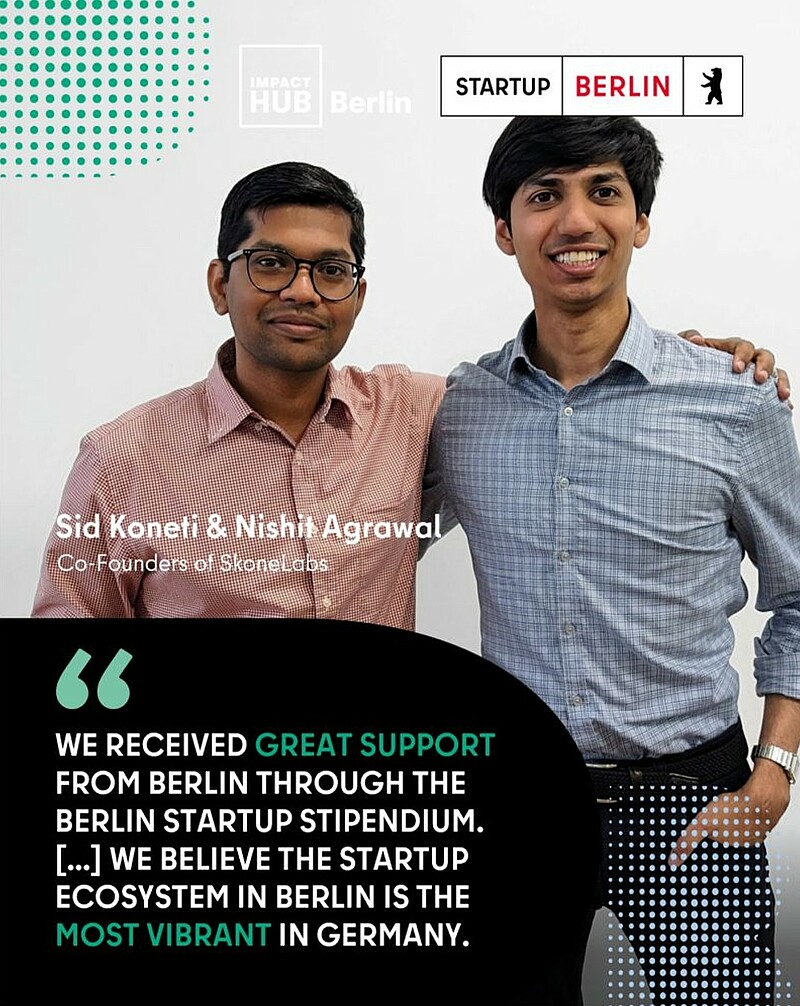
Can you tell us about your impact startup or project?
At SkoneLabs we bring AI applications to the companies in the food value chain to perform quality monitoring and shelf-life prediction of their produce which has a direct impact on reducing food loss.
Why did you choose Berlin as the base to bring your idea to life?
We received great support from Berlin through the Berlin Startup stipendium, thanks to Impact Hub Berlin. They are doing a brilliant job and have supported us from the very beginning. We believe the startup ecosystem in Berlin is the most vibrant in Germany.
How do you envision the future of Berlin’s startup ecosystem?
Berlin's startup ecosystem is good and there is so much energy here. Ideally we wish the ecosystem would attract more industrial players and risk takers to support startups growth.
What advice would you give to aspiring founders or other impact startups?
Do not wait for perfection, start executing.
Which Berlin-based resources, events, or networks have been the most helpful on your journey?
Impact Hub Berlin is a great ecosystem to kick off. Founders can also check further incubators and accelerators such as: Antler Berlin, K.I.E.Z. Künstliche Intelligenz Entrepreneurship Zentrum accelerator, MotionLab.Berlin, EWOR or Techstars.
Networking spotlight: Are there any specific impact collaborations you’re seeking?
Considering our offerings, we are seeking collaboration in hardware entities that are serving the food value chain, especially entities handling coffee products.
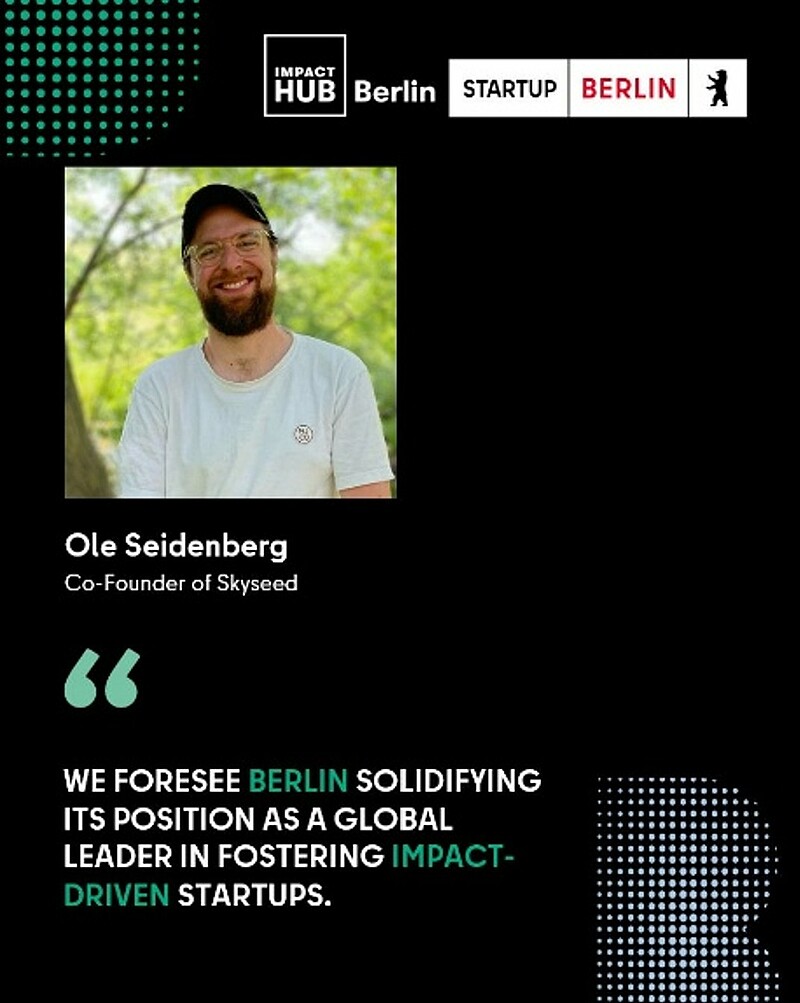
Can you tell us about your impact startup or project?
Skyseed is dedicated to addressing the challenges posed by climate change on our forests. We employ advanced drone technology and proprietary pelletised seeds to facilitate rapid and efficient reforestation.
Why did you choose Berlin as the base to bring your idea to life?
Berlin's dynamic start-up ecosystem is a given. But no, to be honest: we mainly live here and one thing led to another. We didn't really actively choose Berlin, and we also have a second location in southern Germany where we produce our seed pellets. However, we love our "LAB" at the Impact Hub because it combines typical industrial office space with a workshop atmosphere, which suits us very well.
How do you envision the future of Berlin’s startup ecosystem?
We foresee Berlin solidifying its position as a global leader in fostering impact-driven startups. With its role as the political capital of Germany, diverse talent pool, and emphasis on sustainable innovation, the city is poised to nurture ventures that address pressing global challenges.
What advice would you give to aspiring founders or other impact startups?
Embrace the synergy between technology and nature. Real change essentially requires on-the-ground action that moves molecules and hearts, not just data, dashboards and marketplaces. Stay adaptable, be open to collaboration, and stay committed to your mission, even when it sometimes feels like an endless tunnel without light.
Which Berlin-based resources, events, or networks have been the most helpful on your journey?
I am happy to be part of Impact Hub Berlin, because many entrepreneurs with a similar mindset are active there. The Phineo network was also helpful, as was the network of our angel club Better Ventures.
Networking spotlight: Are there any specific impact collaborations you’re seeking?
We are very keen to work with organisations and research institutions that focus on biodiversity and sustainable forestry, and with companies willing to invest in a future where CO2 is not the only currency in solving climate change, but one of many in a world that strives to restore biodiverse and resilient ecosystems.
Header image: Impact Hub Berlin

